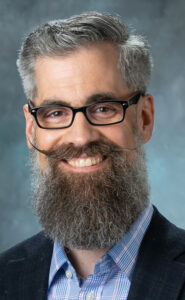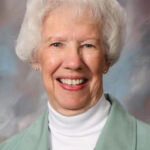By Matthew Coomber
One of the joys of teaching biblical studies at St. Ambrose University in Davenport is exploring the Bible’s ancient wisdom with young minds. While I teach my students interpretive methods, historical contexts and strategies for applying the Bible to the modern world, they open texts I have studied for decades in new and exciting ways by allowing me to read the Bible through their own unique perspectives. A year after George Floyd’s murder and our nation’s ongoing racial reckoning, my students have been breathing new life into the Exodus story, and its ability to speak to our time.

An important thing to understand about Exodus is that it is sparked by an irrational fear of demographic change, which led a new Pharaoh down a sinister path. The Hebrew religious/ethnic minority in Egypt had come to outnumber the traditional majority, leading Pharaoh to proclaim: “Come, let us deal shrewdly with [the Hebrew people] to stop their increase; otherwise, in time of war they too may join our enemies to fight against us.”
Why was Pharaoh fearful? What led him to suspect the Hebrews of sedition? They were not foreigners, but residents for so long that this new Pharaoh had forgotten the tales of their ancestor, Joseph, who had been Egypt’s second in command. There was no rationale for Pharaoh’s fear: the Hebrews had been made the other. This otherness — combined with the Hebrew people’s increased numbers — led to the kinds of ethnic violence that are found around the world and across time. In Exodus, this violence played itself out in the form of enslavement and infanticide. What is more, it results in God’s clear judgement of Pharaoh’s reaction: it ends in great suffering, as God’s divine wrath was unleashed upon Pharaoh’s empire through plagues, culminating in the Passover. This year, my students helped me to see Exodus in new ways as they drew lessons I had not considered.
In one class, my students discussed how the Pharaoh’s anxiety over demographic change is akin to what we are seeing in the U.S. as our country nears the year 2045, when Caucasians will no longer be in the majority. Whereas Pharaoh’s fear morphed into state oppression, my students saw our modern context playing out through terrorism. Comparing Pharaoh’s fear of Hebrew sedition to Islamophobia, students spoke of attacks against Muslim Americans under a pretext that they might align with ISIS.
They related Pharaoh’s fear of demographic change to the Neo-Nazi chant, “the Jews will not replace us!” heard at the 2017 Unite the Right rally in Charlottesville. The chant references the white supremacist great replacement theory, which wrongly claims that our demographic shifts are being orchestrated. This false conspiracy theory inspired a gunman to murder 11 people at the Tree of Life synagogue in 2018, and another to target Latino/a shoppers in El Paso in 2019, killing 23 people.
Others observed that fears over demographic change are not new to the U.S. The Colt revolver was designed to prevent American slave revolts. Jim Crow laws were created to keep African Americans from obtaining quality education, political office, economic advancement and more. The same ends were achieved through such terrorist acts as lynching and the race massacres of Colfax, Chicago and, of course, Tulsa in 1921. Diseases, like racism, cannot heal without understanding root causes, but medicine is also vital and my students found plenty in Exodus. One example was the lesson they took from Shiph’rah and Pu’ah: the Hebrew midwives.
Women are named rarely in the Old Testament, so when we find named women, readers need to pay attention. Shiph’rah and Pu’ah were the lowest of the low in their male-dominated world: female slaves. Yet my students saw in them a powerful example for resisting oppression. In refusing to partake in Pharaoh’s infanticide, they defied the most powerful person in the world. When confronted by Pharaoh, himself, they didn’t even show him the respect of offering a legitimate excuse. Rather, they claimed that Hebrew women “are hardy and give birth before the midwife can get to them.” If that were true, why did Hebrew people even have midwives? Their lie was so transparent that it appears to have been intended to inflict insult rather than escape judgement. My students related the midwives’ strength to Rosa Parks who, through her courage to say “No!” to oppression, and accept the consequences, inspired a whole generation of resisters.
I do not have to teach my students that we are living through a national crossroads. They are well aware. What I find exciting is that although I have published on how Exodus has been used throughout U.S. history to confront racism, my students continue to uncover new truths for me in this divine tale. These truths help us to understand better the problem of racism and to find the courage to both recognize and confront it in our communities.
(The Rev. Matthew J.M. Coomber is a professor of Biblical Studies at St. Ambrose University and a priest in the Episcopal Church.)











